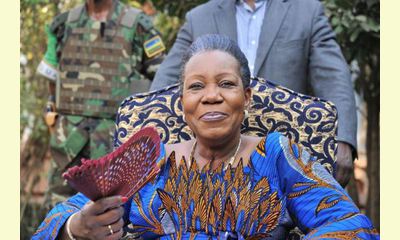|
|
Samba-Panza’s election represents a bright future for African women in politics
un articulo por Krista Ritterhoff for Cistern Yard (abridged)
Last Monday, Central African Republic chose a
leader the people believe can pull the country out
of its destructive downward spiral. The leader
the people of this troubled nation look to with
great and hopeful expectations may come as a
surprise. Her name is Catherine Samba-Panza – and
yes, she is a woman.

photo from http://afriquenewsblog.wordpress.com/
click on photo to enlarge
Samba-Panza was chosen over several other
candidates to tackle the tough job of bringing
security back to a country that has been plagued
by violence and chaos since December 2012. While
most headlines about the country mention mass
killings, rapes, public executions and religious
conflict, Samba-Panza’s election offers a glimpse
of positivity and hopefulness for Central African
Republic. Although some of the world may look
skeptically at the nation’s decision to put a
woman at the helm, the choice makes perfect sense
to those who have lived through conflict.
“Everything we have been through has been the
fault of men,” said Maria-Louise Yakemba, the
leader of a civil society organization in the
country. “We think that with a woman, there is at
least a ray of hope.” Even Samba-Panza herself
has said that her “sensibility as a woman” will be
one of the most important tools she will use in
bringing the country back from the brink.
Central African Republic is not the only nation
that sees this sensibility in a leader as the key
to a more secure future. In 2012, Malawi elected
their first female president Joyce Banda, and in
the same year Senegal elected their first female
prime minister. Liberia recently re-elected their
female president for a second term, and in Rwanda
– a country infamous for its violent history –
women hold 64 percent of the parliamentary seats.
Another huge sign of a positive movement for women
is that the African Union now has a female chair
for the first time in its history.
The recent surge of women gaining political power
speaks to the success of many women’s groups and
movements throughout Africa. Women’s group
activism in democratization and politics has led
them to become politically dominant in many
countries, but these groups have grown powerful by
working out of government. Because of the
corruption and sexism that has plagued many
political regimes in Africa, they independently
developed their own resources and followings. . .
.
Some of the world’s poorest and most downtrodden
countries have broken from tradition and chosen a
new direction of leadership. As our country seems
to be moving backward in terms of gender equality,
maybe it is time for the western world to learn a
lesson from Africa and celebrate a more active
role for women in politics. The women of Africa
are blazing a trail through new territory and
their voices are being heard all across their
continent. Now it’s just time for the rest of the
world to hear them as well.
|








|
DISCUSSION
Pregunta(s) relacionada(s) al artículo :
Do women have a special role to play in the peace movement?,
* * * * *
Comentario más reciente:
:
The 30 articles in CPNN linked to this question make it clear that women indeed have a special role to play in the peace movement. See the following for an historical explanation of why this is true.

|
|









